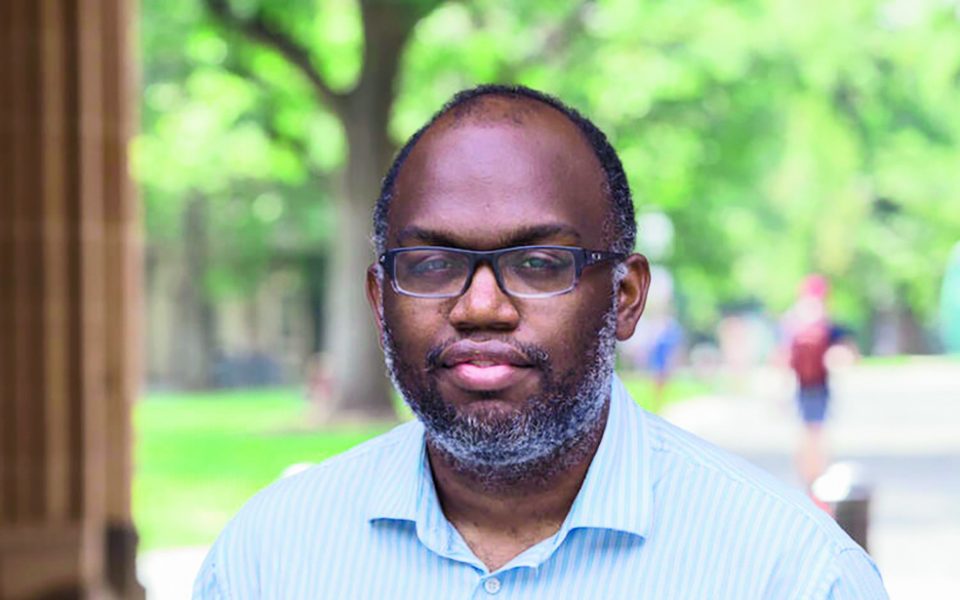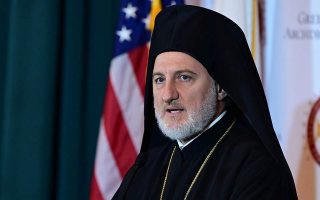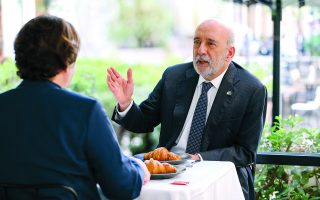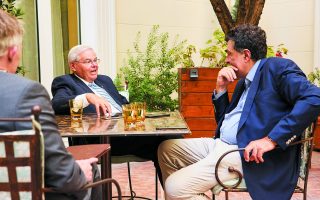Classical studies needs structural changes
Princeton professor Dan-el Padilla Peralta explains that there is a history of race and racism within the subject that should be addressed

Dan-el Padilla Peralta is not very well known in Greece. Or, at least, he wasn’t until a few months ago, when the Dominican-born associate professor of Classics at Princeton was portrayed in the media as the chief advocate for the revisionist movement sweeping US universities which draws a link between Classical studies, as they are taught today, and racism and the construction of “white supremacy.”
Professor Peralta is considered an expert in ancient Roman history. Apart from his interest in Classical studies, this interview was also occasioned by the publication of his latest book, “Divine Institutions: Religions and Community in the Middle Roman Republic” (Princeton University Press). In his book, Peralta argues that religion and temple construction, rather than political or military leadership, was the glue that kept the 4th and 3rd century BC Roman Empire united in its years of expansion with the Punic Wars. “While military obligations were very important for Roman society, religion took up a very large portion of its time, while politics came third,” Professor Peralta told Kathimerini.
The professor grew up in an intensely religious environment, spending time in Roman Catholic churches observing mass. His parents were devout Catholics, and especially his mother. In his 2015 memoir, titled “Undocumented: A Dominican Boy’s Odyssey from a Homeless Shelter to the Ivy League,” he details his family’s journey from the Dominican Republic to the USA when he was 4 years old. When their visas expired, his father returned to the Dominican Republic while young Dan-el lived with his mother in refugee shelters under the fear of deportation.
In a small library, Dan-el found a book about the life of ancient Greeks and Romans, which marked him for life. He continued to devour books until he met photographer Jeff Cohen, who appreciated his academic potential. With Cohen’s help, Dan-el won a scholarship for a prestigious Manhattan private school and was later accepted to the Department of Classics at Princeton, where he graduated summa cum laude.
His relationship with religion has now changed, and he considers himself a skeptic. We asked him if he is also a skeptic toward Classical studies. “I think that is fair,” he said, smiling. “My approach to Classical studies is, in general terms, that of a skeptic.” He explained: “We in the field of Classics have a duty to think about our responsibility and about our obligations. The reckoning that interests me is in the fields of historical entanglements with the architecture of race and specifically the architectures of white supremacy. To that end I think it is important to emphasize as I have regularly in the past few years that the invitation to that reckoning is the invitation to become better researchers.”
We asked the professor to tell us what he believes is wrong with the current teaching of Classical studies. “What I see as problematic is the incredible unwillingness to take seriously the provocation that there is a history of race and racism within Classics and that Classics as a discipline is very much a part of broader constructions, Euroamerica and global constructions of white supremacy. The problems will not be solved if we keep saying that it’s all in the past. I diagnosed this as part of a mode of refusing the reckoning, because this is the mode of the disciplinary encounter well practiced in some circles of Classics that holds that all we need to do is simply say that there were bad things in the past and then just move on and pretend as if nothing has happened. This is ineffectual at best and deeply corrosive at worst.”
We asked Peralta to tell us what he would like to change immediately. “For one thing, the continuing inability of the field to recruit and maintain scholars of color is a direct consequence of micro and macroaggressive encounters that people of color experience. I would be very happy if we could stop that.” For this to happen, steps need to be taken, “encompassing pedagogy, research, institutional support for folks of color, and I think most extensively a full-scale reimagining of the 21st century university and its Euroamerican incarnation and its global projections.” In order for non-white students to feel welcome, “we will need to tell the hard truths about our field,” said Peralta, adding that it is crucial to distance ourselves from the unjust practices and traditions of the past.
Slavery is a good illustration of this. There are quite a few textbooks for the study of Latin and Ancient Greek that are remarkably blind to, oblivious to, indifferent to the traumas of slavery and the impact those traumas had on enslaved people in ancient times but also on the people who are affected by modern forms of slavery. The professor clarified that he is referring only to certain aspects of the field. “I am in no way saying that we should stop studying the ancient civilizations of the Mediterranean. That would be wrong. But we need to make structural changes. Some of them will give rise to some negative commentary, but that is a good thing. Because criticism makes us and the field better.”
As regards the recent policy changes at Princeton which rendered Latin and Ancient Greek non-mandatory fields of study under the Classics curriculum, Peralta said: “I don’t think this makes their study obsolete, nor does it cancel the languages. These are initiatives undertaken under the broader vision for a more inclusive Classical studies curriculum.”
Some argue that drawing a connection between Classical studies and racism has led to university departments being shut down. Peralta commented: “On the one hand, when the quick shutting down of departments leads to the stopping of investigations on the connection, then we have failed, because it shows that our instinct for survival is greater than our willingness to properly investigate and grow. On the other hand, those who shut down university departments usually just hide behind this public reason. They probably wanted to do so for some time, and just seized this opportunity to do it.”
On the day we spoke to Professor Peralta, an online conference took place under the Institute of Classical Studies in London, about how the field can become more inclusive. This trend belongs to the young researchers, Peralta pointed out. “They are more open to the broad range of intellectual abilities that are needed in order to create a fairer field of Classical studies. One needs to study beyond the field, to read about Black studies and racial studies, to become more familiar with new fields and researchers. Again, I must stress that we are criticizing Classical studies only because we think that we should look at things critically.”
For the future of Classical studies, Peralta envisions a space open to dialogue, studying the ancient world more holistically. “A lot of work needs to be put into this, now and in the future,” he said. “For things to change, there needs to be a more radical review of Classical studies beyond curriculum modifications. We need a change in policy. We must renovate the field and look into funding inequalities.”
“What I see as my future in the field is a future of stewardship. I want to support other scholars in this work as much as I can. I want students to learn about the views of Charles Mills, ‘Black Classicism,’ and the studies of Paul Gilroy on how Western civilization was built upon slavery. The creation of new paths for knowledge requires us to move beyond universities, and for this reason I must seek a role beyond academia.”





